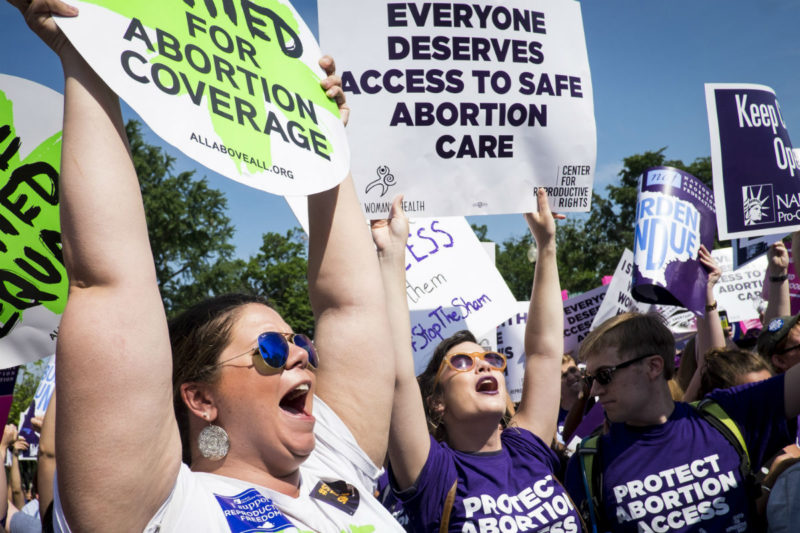Advocacy Groups Reveal ‘Groundbreaking’ Progressive Vision for Reproductive Justice Future
Key to the plan is a single unifying vision for what progressive, inclusive reproductive health and justice legislation should seek to accomplish.

Reproductive and social justice advocacy groups released a groundbreaking legislative plan this week spelling out priorities to create a future where sexual and reproductive health, rights, and justice doesn’t depend on someone’s identity, age, or income.
The plan has been under development for two years and is co-signed by over 100 local and national advocacy groups. It is designed to create an opportunity for lawmakers to go from defense to offense on reproductive justice issues after years of all-out assaults from the Trump administration and GOP state and federal legislators.
“This vision has really at its base a human rights framework of looking at the world,” said Marcela Howell, founder and executive director of the racial and reproductive justice group In Our Own Voice: National Black Women’s Reproductive Justice Agenda, in an interview with Rewire.News. “So all of these groups coming together wanted to come up with what we thought was a sexual and reproductive rights, health, and justice vision for the future. And we wanted to make sure that it was inclusive and bold.”
Key to the plan is a single unifying vision for what progressive, inclusive reproductive health and justice legislation should seek to accomplish. “Every person has the basic human right to quality health care, and no individual or community should be left behind,” reads the plan. “Each of us should have the chance to live safe, healthy lives and be free to determine our own path—including if, when, and how to create a family. Each of us, too, should be able to raise and care for children with dignity and freedom from violence, discrimination, or denial of our basic human rights and needs.”
Organizers are hoping to catch the interest of several new members of the U.S. Congress and state legislators who ran and won on reproductive justice issues, with a specific, comprehensive legislative plan set to be released sometime in Spring 2019. Those behind the plan hope to unite national and local organizers as anti-choice conservatives continue to attack reproductive rights despite Democrats, most of them pro-choice, reclaiming over 330 federal and state-level legislative seats in this year’s midterms.
“On Election Day, women — particularly women of color — rose up and voted to protect reproductive rights and access to health care,” said Dr. Leana Wen, president of Planned Parenthood Federation of America, in a statement on the plan. “We look forward to fighting alongside newly elected officials to protect our care—elected officials who we know recognize that sexual and reproductive health care is health care, and health care is a fundamental human right.”
“Thanks to people across the country flexing the muscles of democracy, we now have a better future that we can look forward to,” said Kimberly Inez McGuire, executive director at Unite for Reproductive & Gender Equity (URGE), in an interview with Rewire.News. “We will now have more legislators that support LGBTQ rights, that support abortion rights, so it is absolutely the time to say, ‘OK, great folks are now in power who’ve been talking about these values, now is the time to put your legislating where your mouth is.’ And this blueprint shows them how to do that—it starts the conversation from a place of values to say, ‘Here’s what we believe in, here’s what you should be centering in your agenda.’”
The vision statement calls for legislative attention to several key reproductive health issues, including ending refusals of care based on personal views and ensuring that all people have access to quality and affordable health insurance. Not only is access to insurance needed, according to the document, but abortion care and birth control should be covered by that insurance. Another policy goal spelled out in the plan is overturning the Hyde and Helms amendments, which ban federal tax dollars and U.S. foreign aid from funding abortion care, respectively.
Inez McGuire stressed that the vision presented in the plan is a strong move into a more progressive space for the reproductive justice movement, specifically highlighting the gender inclusive language used in the plan as an example. “People of all gender identities need abortion care, and we have to de-link these really gendered conversations from conversations about abortion and other reproductive care because they invisiblize trans and nonbinary folks who also need this care.”
That inclusivity was very purposeful according to Preston Mitchum, senior legal and international policy analyst for Advocates for Youth, one of the co-signers of the plan. “We’ve unfortunately seen … people cut their nose [off] to spite their face,” he told Rewire.News in an interview. “We’ve seen over the years how marginalized communities have been pitted against marginalized communities for sake of a more ‘progressive’ movement or the sake of getting little wins. And here we’re not willing to replace any community for the sake of a win. We don’t win unless we all win.”
UPDATE: This piece has been updated with a statement from the president of Planned Parenthod and to clarify the name of In Our Own Voice: National Black Women’s Reproductive Justice Agenda.

